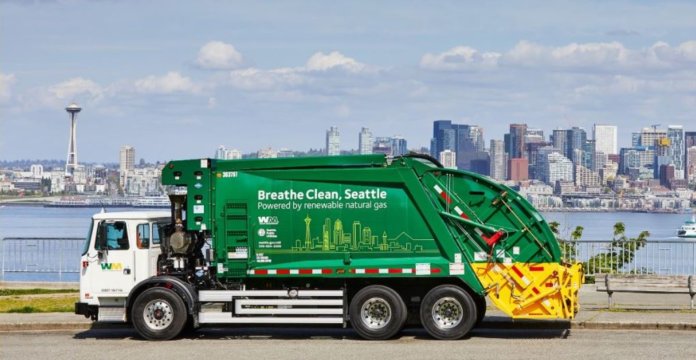Seattle Public Utilities (SPU) is rolling out a fleet of close to 200 contractor trucks powered by electricity, renewable natural gas (RNG) and renewable diesel.
SPU, which dubs the vehicles its “green fleet,” expects to have rolled out the full fleet by early 2020. Most of the vehicles started servicing SPU customer routes this spring.
“Meeting our 2050 carbon-neutral goal will require creative thinking from every corner of our city. Our new green fleet at Seattle Public Utilities is another example of Seattle leading the world and taking bold action to protect our communities from the impacts of climate change,” says Seattle’s mayor, Jenny A. Durkan.
The green fleet includes 91 Waste Management trucks powered by RNG, which begins as a biogas when trash decays in landfills. The fleet also includes 80 Recology trucks that are powered by hydrogenated-derived diesel, produced from a range of renewable feedstocks, such as vegetable waste, soybean oil and animal tallow. Both the RNG and renewable diesel trucks have engines that produce near-zero or ultra-low emissions, notes SPU.
The green fleet also includes two electric Class 8 rear-load trucks, plus four electric midsize trucks for smaller routes and container delivery, and 12 small hybrid or electric trucks or cars.
According to the city, RNG can lower emissions 70% over traditional diesel and 65% over compressed natural gas (CNG). In addition, renewable diesel can lower emissions 65% over traditional diesel and 30% over CNG, the city says.
“As a national leader in green solid waste services, Seattle Public Utilities is committed to cleaner air, achieved in part by green fuels and less emissions,” says Mami Hara, general manager of SPU. “We thank our solid-waste partners, Recology and Waste Management, and our customers, for their shared commitment to protect our environment.”
“We applaud SPU and their contractors for blazing a trail to reduce carbon pollution,” adds Jessica Finn Coven, director of Seattle’s office of sustainability and environment. “This announcement underscores Seattle’s leadership in turning climate policy into action and serves as a blueprint for other cities across the U.S. to eliminate carbon emissions from this vital service.”





